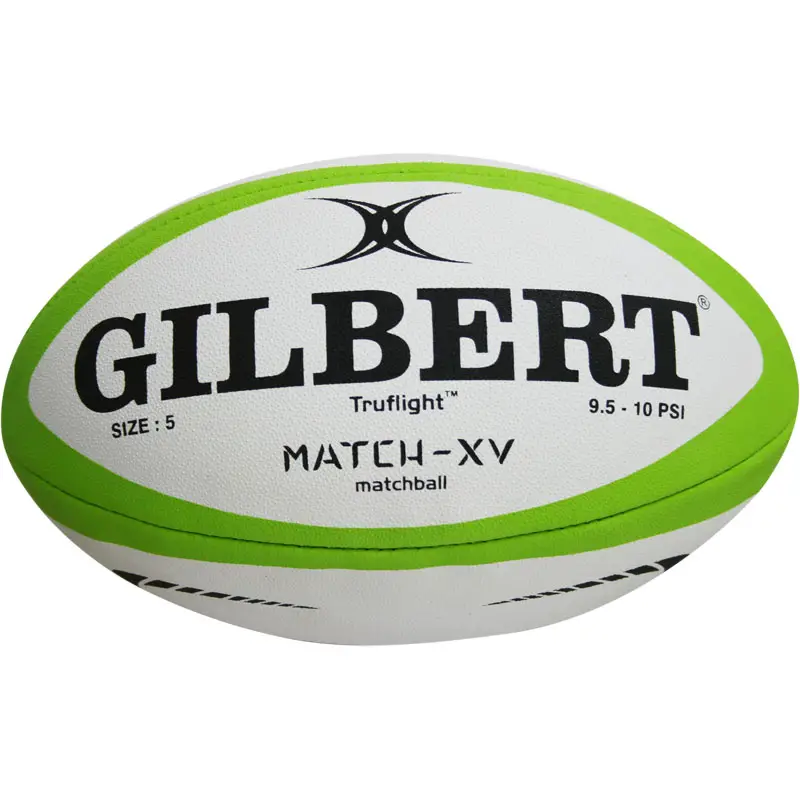Rugby is a thrilling and high-impact sport that requires a ball that can withstand intense handling and provide reliable performance. Choosing the right rugby ball can make all the difference in the game. With a variety of options available in the market, it can be overwhelming to decide which one to buy. In this blog, we have compiled a list of the 10 best rugby balls on the market, highlighting their features, advantages, and disadvantages. Whether you’re a beginner or a seasoned rugby player, our guide will help you choose the right ball for your needs and level of play.

- Gilbert Rugby Match XV Ball
Price: $85
Features: Hand-stitched, textured surface for grip, official match ball of the Rugby World Cup
Material: Rubber and Synthetic
Weight: 410-460 grams
Advantages: Excellent grip, official match ball of Rugby World Cup, accurate flight and performance
Disadvantages: Expensive, requires proper care and maintenance to last long.
2. Rhino Rugby Vortex Elite Match Ball
Price: $90
Features: Hand-stitched, 3D grip pattern, superior balance, and control
Material: Natural rubber
Weight: 410-460 grams
Advantages: Superior grip, durable, perfect for professional matches and training
Disadvantages: Expensive, heavy.
3. Adidas Malice Rugby Ball
Price: $40
Features: Hand-stitched, textured surface for grip, designed for kicking and handling
Material: Rubber
Weight: 410-460 grams
Advantages: Durable, good grip and feel, affordable
Disadvantages: Not suitable for wet conditions, requires regular maintenance.
4. Canterbury Phoenix Elite Rugby Ball
Price: $60
Features: Hand-stitched, 3D grip pattern, superior balance, and control
Material: Natural rubber
Weight: 410-460 grams
Advantages: Excellent grip, durable, perfect for professional matches and training
Disadvantages: Expensive.
5. Optimum Street Rugby Ball
Price: $15
Features: Hand-stitched, textured surface for grip, designed for street play
Material: Rubber
Weight: 400-450 grams
Advantages: Affordable, durable, good for street play
Disadvantages: Not suitable for professional matches, heavy.
6. Kipsta Rugby Training Ball
Price: $10
Features: Hand-stitched, textured surface for grip, ideal for training and beginner players
Material: Rubber
Weight: 410-460 grams
Advantages: Affordable, durable, good for training
Disadvantages: Not suitable for professional matches, heavy.
7. Rhino Cyclone Rugby Ball
Price: $30
Features: Hand-stitched, textured surface for grip, designed for all levels of play
Material: Natural rubber
Weight: 410-460 grams
Advantages: Affordable, durable, good for all levels of play
Disadvantages: Heavy, requires regular maintenance.
8. Canterbury Phoenix Raze Rugby Ball
Price: $30
Features: Hand-stitched, textured surface for grip, designed for forwards
Material: Natural rubber
Weight: 410-460 grams
Advantages: Excellent grip, durable, perfect for forwards
Disadvantages: Heavy, requires regular maintenance.
9. Optimum Inferno Rugby Ball
Price: $25
Features: Hand-stitched, textured surface for grip, designed for all levels of play
Material: Rubber
Weight: 400-450 grams
Advantages: Affordable, durable, good for all levels of play
Disadvantages: Heavy, requires regular maintenance.
10. Adidas All Blacks Rugby Ball
Price: $35
Features: Hand-stitched, textured surface for grip, designed for all levels of play
Material: Rubber
Weight: 410-460 grams
Advantages: Affordable, durable, good for all levels of play
Disadvantages: Heavy, requires regular maintenance.
Conclusion
Choosing the right rugby ball is crucial for anyone who wants to play the game, regardless of their level of experience. With so many options available, it’s important to consider factors such as the intended use, level of play, materials, and grip. Our guide has provided a comprehensive list of the 10 best rugby balls currently available on the market, each with its own unique features, advantages, and disadvantages. Whether you’re a professional player, a weekend warrior, or a beginner, our guide will help you make an informed decision when selecting the right rugby ball for you. With the right ball in hand, you can take your game to the next level and fully enjoy the thrills and excitement of rugby.
FAQ
What is the size of a rugby ball? A rugby ball is oval in shape and has a length of 280-300mm, a width of 740-770mm, and a circumference of 580-620mm.
What is the weight of a rugby ball? The weight of a rugby ball typically ranges from 410-460 grams, depending on the specific model and intended use.
What are rugby balls made of? Rugby balls are made from various materials, including rubber, synthetic materials, and natural leather. The choice of material often depends on the specific use of the ball.
What is the difference between a match ball and a training ball? A match ball is designed for use in official matches and is often made with higher-quality materials and features a more advanced construction for improved accuracy and performance. A training ball is designed for practice and often features a more durable construction for long-lasting use.
How do you choose the right rugby ball? When choosing a rugby ball, consider the intended use, the level of play, and the personal preference for weight and grip. It’s also important to consider the materials and construction quality for durability and performance.
How do you care for a rugby ball? To ensure a rugby ball lasts longer, it’s important to keep it clean and dry after use. Avoid storing it in damp or humid conditions, as this can damage the materials. It’s also recommended to regularly clean and oil the ball to maintain its grip and performance.
